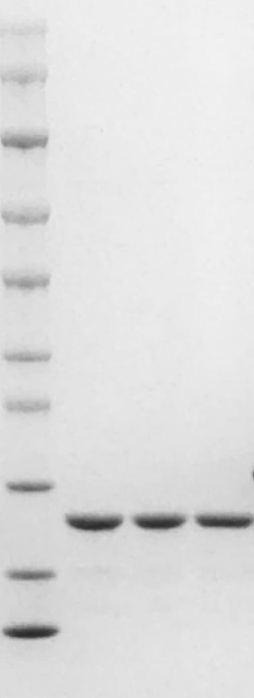| Product name | Mouse G-CSF protein |
| Sequence | Amino acid sequence derived from Mouse G-CSF protein (P09920)(V31-A208) was expressed. |
| Applications | No tag |
| Applications notes | Mouse |
| Activity | Measured by its ability to induce proliferation in M-NFS-60 cells. The ED50 for this effect is 2.038 pg/mL |
| Protein length | The Recombinant Mouse G-CSF protein consists of 178 amino acids and predicts a molecular mass of 18.95 KDa |
| Preparation method | E. coli |
| Purity | > 99 % as determined by SDS-PAGE |
| Alternative | G-CSF; Colony Stimulating Factor 3; Granulocyte; GCSF |
| Formulation | Lyophilized from sterile 20 mM Tris with 150 mM NaCl, pH 7.4 |
| Features & Benefits | Endotoxin : <1.0 EUper μg of the protein as determined by the LAL method |
| Molecular weight | 18.95 kDa |
| Usage notes | Always centrifuge tubes before opening. It is recommended to reconstitute the lyophilized Mouse G-CSF protein using the buffer we provided not less than 100µg/ml, which can then be further diluted to other aqueous solutions. |
| Storage instructions | Lyophilized Mouse G-CSF protein product should be stored desiccated below -20°C. Upon reconstitution, the protein should be stored at 4°C between 2-7 days and for future use below -20°C. For long term storage it is recommended to add a carrier protein (0.1% HSAor BSA). Please prevent freeze-thaw cycles |
| Shipping | The product is shipped at ambient temperature. |
| Precautions | The product listed herein is for research use only and is not intended for use in human or clinical diagnosis. Suggested applications of our products are not recommendations to use our products in violation of any patent or as a license. We cannot be responsible for patent infringements or other violations that may occur with the use of this product. |
| Background | Granulocyte-colony stimulating factor (G-CSF) is a growth factor and an essential cytokine belonging to the CSF family of hormone-like glycoproteins. It is produced by numerous cell types including immune and endothelial cells. G-CSF binding to its receptor G-CSF-R which belongs to the cytokine receptor type I family depends on the interaction of alpha-helical motifs of the former and two fibronectin type III as well as an immunoglobulin-like domain of the latter. Recent animal studies have also revealed that G-CSF activates multiple signaling pathways, such as Akt and also the Janus family kinase-2 and signal transducer and activation of transcription-3 (Jak2-STAT3) pathway, thereby promoting survival, proliferation, differentiation and mobilisation of haematopoietic stem and progenitor cells. G-CSF is a cytokine that have been demonstrated to improve cardiac function and perfusion in myocardial infarction. And it was initially evaluated as a stem cell mobilizer and erythropoietin as a cytoprotective agent. G-CSF prevents left ventricular remodeling after myocardial infarction by decreasing cardiomyocyte death and by increasing the number of blood vessels, suggesting the importance of direct actions of G-CSF on the myocardium rather than through mobilization and differentiation of stem cells. Accordingly,recombinant human (rh)G-CSF has been extensively used in clinical haematology and oncology to enable bone marrow transplantation or to treat chemotherapy-associated neutropenia. In preclinical study, G-CSF improved cardiac function and perfusion by angiomyogenesis and protection of cardiomyocytes in myocardial infarction. |
| Gene ID | 12985 |
| Alternative | G-CSF; Colony Stimulating Factor 3; Granulocyte; GCSF |
| Accession | P09920 |

You must be logged in to post a review.
Reviews
There are no reviews yet.